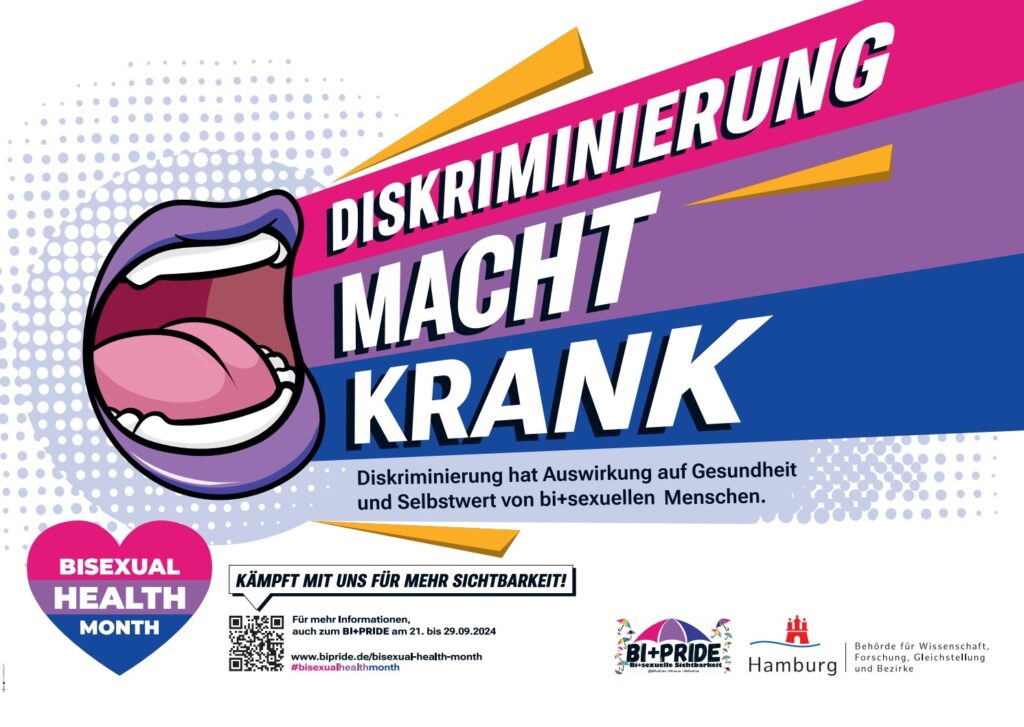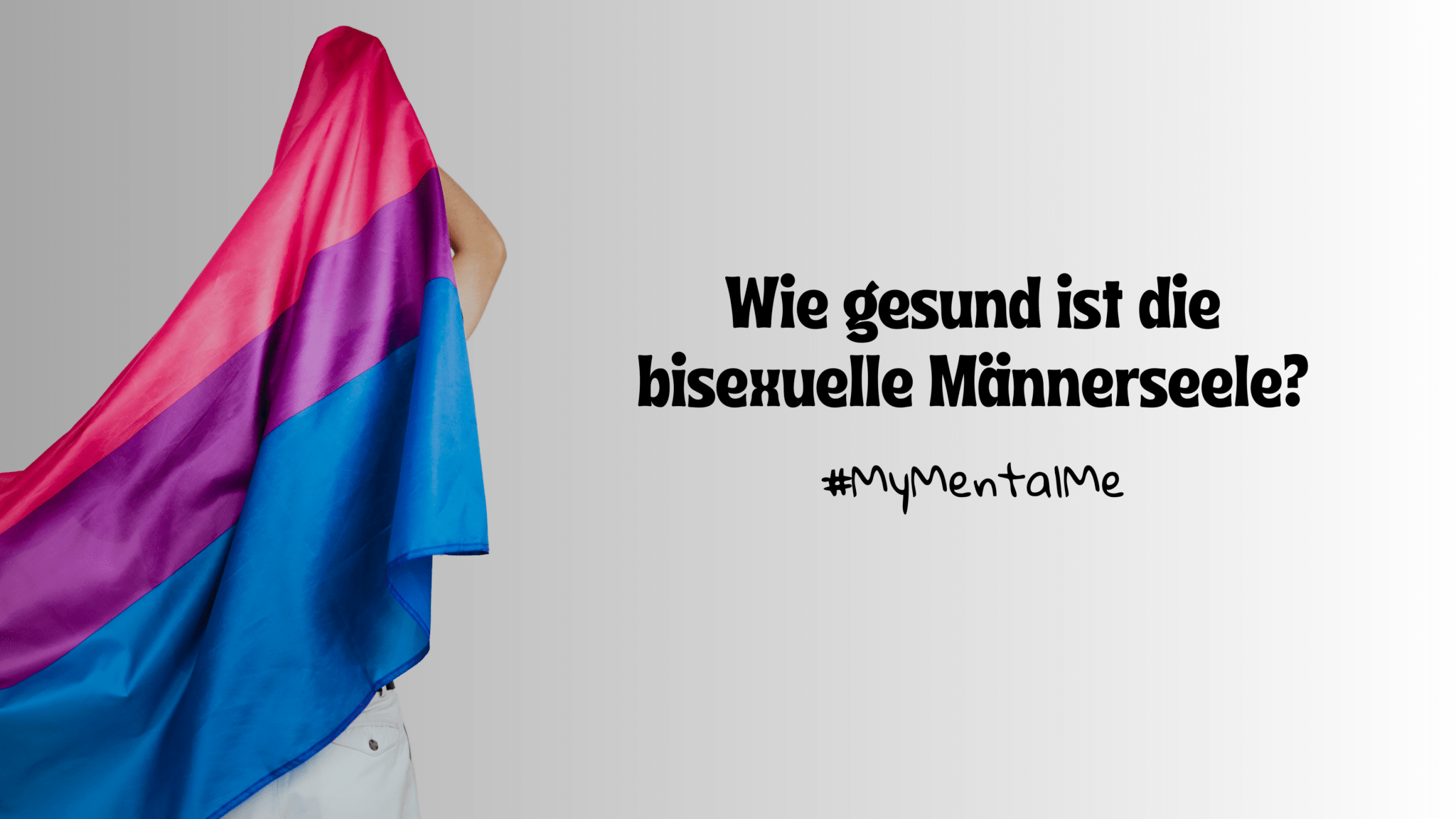Be a real man ...
Yes, I used to say that I was bisexual too, you'll come out as gay ...
It's okay that you're bi, but it's nothing for me ...
Why don't you decide - gay or straight ...
Do you always have to come up with this topic ...
But I am not bisexual ...You don't even know who you are with now!!!
There are plenty of prejudices and stupid comments when you come out as bisexual or pansexual. Only a few people really know anything about the subject, but everyone thinks they have to make a comment and devalue you.
March is Bisexual Health Month, and Bi+Pride, which has been fighting for bi+sexual visibility since 2021, is not only showing its commitment in September with demonstrations, workshops and bi flag-raisings. In Hamburg and Schleswig-Holstein, several large billboards also make it clear: "Discrimination makes you sick."[1]

But don't bi+ men have it much easier? They can hide in a "hetero relationship" and secretly live out their "homosexual lust"?
First of all, bi+ is not the same as bi+. For example, there are monogamous pansexual men who may be in a committed relationship with a man, but can also fall in love with a woman or non-binary person. But then there are also bisexual men who are in an open relationship with a woman and date men on the side. Or men who call themselves queer or don't use a label at all and are active in both the swinger scene and the male cruising scene. Some are out, others see no reason to tell everyone, and still others don't come out at all, because then their wife would leave them immediately.
The fact is that bi+ people are discriminated against from several sides:
Heteronormative society rejects bi+ men because they are supposedly gay in disguise and are somehow even harder to see through: Which gender do they fancy? Can't they make up their minds?
And in the queer community, as a bi+ man you are sometimes ridiculed and not taken seriously. A gay man once told me that he fancied me, but that he could never be sure if an attractive woman turned up.
The invisibility of bi+ people
In the study "Bi+(In)visibility in Germany" (2023)[2] revealed that a third of respondents would like to see more bi+ visibility in the queer community. In general, almost all (94%) never to [only] sometimes feel generally visible.
No matter which study you look at on the subject, the keyword "visibility" crops up again and again. One's own identity is questioned by others.
The media talk about "gay marriage", although it can affect bi+ people just as much. Freddy Mercury is celebrated as a gay icon, in "Bohemian Rhapsody" his sexual orientation is clearly shown, but nevertheless recognised. And "Brokeback Mountain" is supposedly about gay cowboys, but they are actually bisexual shepherds. And even if there is no active "bisexual erasure", i.e. bisexuality is made invisible, the question remains as to whether you will be seen. After all, most people only think that two men canoodling in the street are probably gay. And no one thinks about the sexual orientation of a man and a woman, but when asked "of course normal ... er ... straight". You would have to walk around holding hands in a threesome, and then the word bisexual is also avoided. You would then be a swinger, polyamorous or simply shrill.
But this invisibility does something to people: According to the Human Rights Campaign Foundation (HRC)[3] bisexuals have an increased risk of mental health problems due to prejudice and "minority stress". Stereotypes such as "bisexuality doesn't exist", "bisexuals are promiscuous", "bisexuals are confused" are mentioned here. There is also talk of double discrimination here - from the heterosexual and queer side.
Yet Julia Shaw wrote in her highly acclaimed book "Bi: Discovering Diverse Love" in 2022 that most people are bisexual but not living it.[4]
As a bi+ activist, I'm certainly no longer quiet and timid, but I used to struggle with not knowing any other bisexuals, not being recognised by women as a potential partner and not being taken seriously in the community. Before I came out, people whispered behind my back about whether I was gay, someone even tried to blackmail me. And after I came out, someone at work thought they had the right to know who I was in a relationship with and who I was having sex with.
I also questioned myself again and again: Are you really bisexual? Do you want to live with a woman or a man? Are the others perhaps right when they say I have to choose? Fortunately, I came to the realisation that I am 100% bisexual and that this is a good thing.
One bisexual campaigner for bisexual visibility, for example, is still plagued by fears and insecurity even after a long period of activism. He is very clearly out and posts something about bisexuality every day. And yet he sometimes has doubts about whether he will really be accepted, doesn't trust himself and doubts.
Another bi man would like to tell his wife that he also likes men, but then she would (in his opinion) leave him immediately. He struggles between suppressing his sexual needs and secretly cheating.
A third man lives in a same-sex relationship and hides his sexual identity because he then has to explain so much, then calls himself gay for the sake of simplicity, but is not quite happy with it.
One bisexual pupil reports bullying and that he always feels like he doesn't belong. In general, the experience shows that more and more bisexual and lesbian girls, trans* and non-binary young people are coming out at school and are active in queer clubs. However, gay and bisexual boys are much less visible, presumably due to fears of being discriminated against. It is essential that further funding for good educational projects is secured. Rosa Linde Leipzig e. V. reported at the beginning of 2024, for example, that queer educational work will no longer be funded.[5] And it remains unclear how the federal action plan "Queer Life" will proceed - the LSVD criticises in an open letter that key points have not yet been delivered.[6] Funding for "schools of diversity" would also be absolutely essential for bi+ pupils. The aforementioned HRC published a study on bisexual young people in 2019[7]96% have difficulties falling asleep at night, 83% of bi+ young people of colour have experienced racism, more than 75% feel hopeless and worthless, only 19% are outed to their parents (for homosexual peers the figure is 29%), only 13% receive important information about their sexual orientation, such as safer sex (incl. PrEP), many regret that adults think it's just a phase. Other studies have also shown higher rates of suicidal thoughts and substance abuse.
A 2020 study in the EU only recognised a slightly worse state of health among bisexual men compared to gay men, but it is generally significantly worse than among heterosexual men.[8]
I could see from the comments under Philip Eickner's interview with me from 2021 that there is still work to be done in the gay community.[9] see: There were many hostile reactions here. But of course there are also positive examples - gay men who support bisexual campaigns and are real allies - I'm thinking, for example, of great collaborations with IWWIT and the LSVD (both regionally and at a national level). It is so important and valuable that we in the queer community fight together and not against each other.
I would like that,
- that bisexuality is more recognised as a legitimate option,
- that bi+ people are received positively,
- The media should report more and better on bisexuality (yes, with positive examples such as the series "Sex Education" or "Crazy Ex-Girlfriend", something really has already been done),
- queer organisations really think along with the B,
- as a bi+ man you are not generally excluded as a partner,
- there is also more information and scientific studies on the subject in the health sector.
After all, it's about time that a bisexual man came out in the German Bundestag. There are actually already three out bisexual women (all from the Greens), two trans* women (also from the Greens), one trans* man used to be in the Bundestag, and there are many gay and lesbian MPs. But there are zero bisexual men.[10]
What can men who are not only into men or women do for their health?
Of course, each person has to decide for themselves whether they want to come out. I can only recommend it because it's important and healthy to be true to yourself and not deny your identity. If you have real friends, support and feel reasonably safe - go ahead. Seek support and dare to do it!
But if there are still problems - you can find help, counselling and therapy, for example, through the VLSP, the association for lesbian, gay, bisexual, trans*, inter* and queer people in psychology[11] or via Queermed Germany[12] (the person behind it has already received several awards for her valuable work).
You can also network with other bisexual men by attending meetings organised by BiNe - Bisexuelles Netzwerk e. V.[13] or to regional regulars' tables[14]. And of course come to the next Bi+Pride[15] to Hamburg.
And don't let anyone tell you that there's something wrong with you or that you have to make a choice - you've made your choice: You're bisexual, pansexual, bi+, open to multiple genders, polysexual, omnisexual, biromantic, queer or whatever. And that's a good thing. It can also change - some bi+ people do become gay or straight at some point, and some gay or straight people still become bisexual in old age or have actually always been bisexual. But you still have to decide for yourself, not conversion therapy or well-intentioned advice from a friend who supposedly knows you better.
Be self-confident, recognise the great sides of bisexuality, educate yourself about the different possibilities of bisexuality with changing partners. Safer sex and show your colours for those who do not yet dare to do so.
Also on my to-do list is definitely the book "Bisexual Men Exist" by Vaneet Mehta[16] - certainly an empowering work for all those who identify themselves in this way.
[1] https://bipride.de/bisexual-health-month/
[2] https://www.instagram.com/bivisible_germany/
[3] https://assets2.hrc.org/files/assets/resources/HRC-BiHealthBrief.pdf
[4] https://sz-magazin.sueddeutsche.de/leben-und-gesellschaft/sexualitaet-bi-julia-shaw-interview-queer-homosexualitaet-91518
[5] https://www.rosalinde-leipzig.de/wp-content/uploads/2024/02/PM_SdV_24_FINAL.pdf
[6] https://www.lsvd.de/media/doc/10570/2023_11_offener_brief_lsvd.pdf
[7] https://hrc-prod-requests.s3-us-west-2.amazonaws.com/files/images/resources/HRC-2019-Bi-Youth-_Report.pdf
[8] https://www.lsvd.de/de/ct/2615-Gesundheit-von-LSBTIQ*
[9] https://www.iwwit.de/blog/2021/08/bisexuelle-stellen-schubladen-in-frage/
[10] https://www.queer.de/detail.php?article_id=38244
[11] https://www.vlsp.de/beratung-therapie/beratungs-und-therapieangebote-von-vlsp-mitgliedern
[12] https://queermed-deutschland.de/nach-empfehlungen-suchen/
[13] https://www.bine.net/content/bi-treffen
[14] https://www.bine.net/content/gruppenliste
[16] https://vaneetmehta.wixsite.com/home










